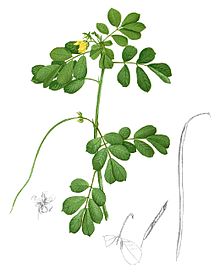Senna tora
| Senna tora | |
|---|---|
 |
|
| Scientific classification | |
| Kingdom: | Plantae |
| (unranked): | Angiosperms |
| (unranked): | Eudicots |
| (unranked): | Rosids |
| Order: | Fabales |
| Family: | Fabaceae |
| Subfamily: | Caesalpinioideae |
| Tribe: | Cassieae |
| Subtribe: | Cassiinae |
| Genus: | Senna |
| Species: | S. tora |
| Binomial name | |
|
Senna tora (L.) Roxb. |
|
| Synonyms | |
|
Numerous, see text |
|
Numerous, see text
Senna tora (originally described by Linné as Cassia tora) is a legume in the subfamily Caesalpinioideae. Its name has been derived from Sinhala language, in which it is called Tora (තෝර). In Sri Lanka it is easily found in many places. It grows wild in most of the tropics and is considered a weed in many places; its native range is not well known but probably South Asia. It is often confused with Chinese senna or sicklepod, Senna obtusifolia. If it is given a distinct common name at all, it is called sickle wild sensitive-plant or sickle senna.
This herb is used in Ayurveda for treatment of swellings. In some parts of Sri Lanka, people add its flowers in food.
The taxonomic history of this plant is extremely confused, even by the standards of Senna and Cassia. S. tora and S. obtusifolia were for long and are often still held to be—and may eventually be verified as—a single species. Hence, taxa referring to either species were indiscriminately applied to both.
The seeds can be found in forest and tribal area of India, Sri Lanka, China and other Asian countries.
...
Wikipedia
